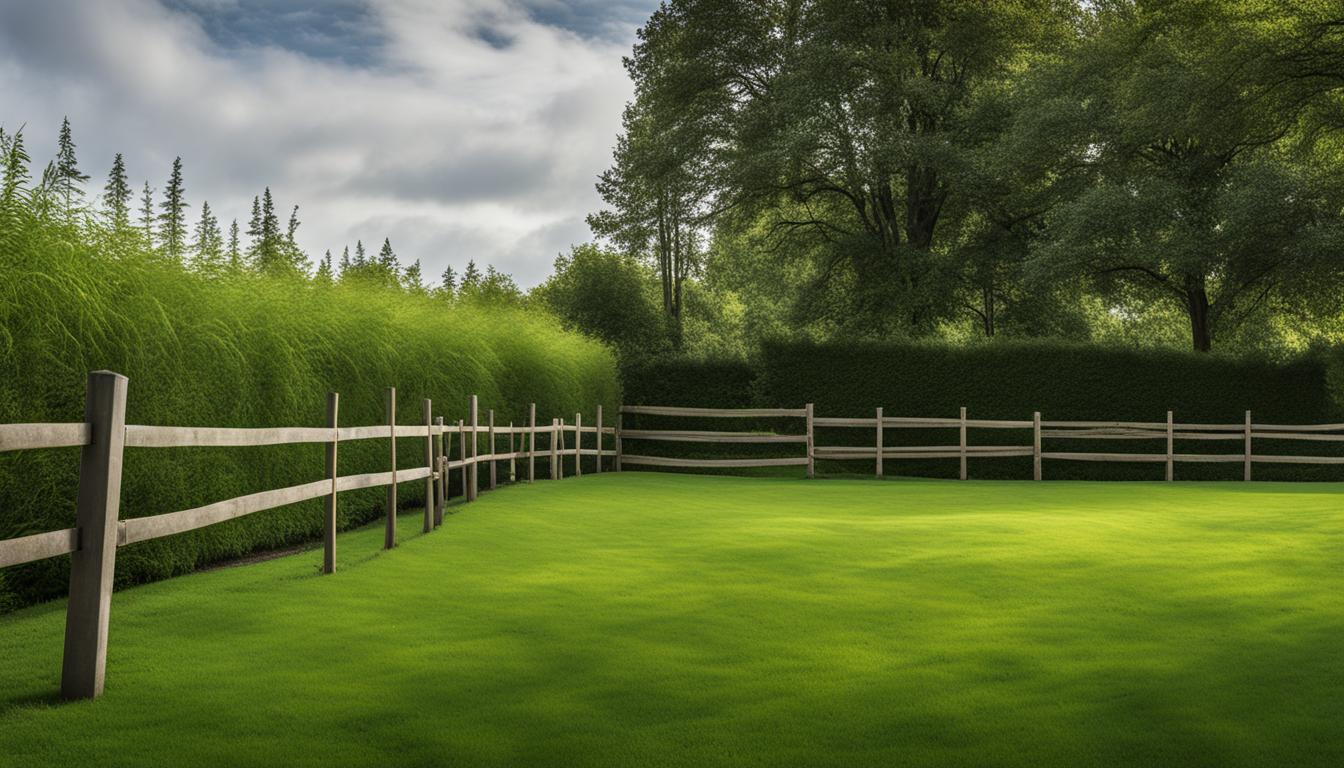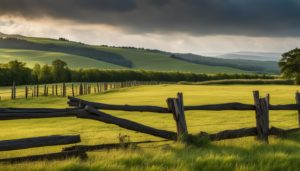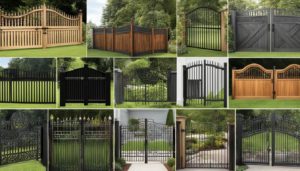Before installing a new fence, it’s important to consider the height regulations and guidelines. Check your local fence regulations, including state and local laws and any Home Owner’s Association (HOA) rules. In Florida, for example, the front yard fence is limited to 4 feet in height, while the sides and rear can go up to 6 feet. Failure to follow these regulations can result in fines and the need to reinstall the fence.
Key Takeaways:
- Research your local fence regulations, including state and HOA rules, to ensure compliance.
- Consider the fence style and purpose when choosing the height for your yard fence.
- Installing a front yard fence can provide security, privacy, and increase property value.
- Accurate measurements and professional installation are crucial for a hassle-free fence installation.
- Choose the right materials for your yard fence based on durability, maintenance, and aesthetics.
Factors to Consider when Choosing Fence Height
When it comes to selecting the height for your yard fence, there are several factors that you need to take into consideration. The style of your fence and its purpose play a significant role in determining the optimal height. Additionally, the choice of materials can also influence the aesthetic appeal and effectiveness of your fence.
Fence Style
The style of your fence can greatly impact the height you choose. For example, if you opt for a traditional wooden fence, such as a picket fence, you may choose a lower height for the front yard, typically around 3 feet, to enhance the curb appeal and create a welcoming aesthetic. On the other hand, if privacy is a priority, a taller fence, reaching a maximum of 6 feet, may be more suitable for the sides and rear of your property.
Fence Purpose
Consider the purpose of your fence when determining the height. Are you looking to enhance privacy, define boundaries, or add security? For privacy, you may prefer a taller fence that prevents prying eyes from seeing into your yard. For security, a taller fence can deter intruders and provide a sense of safety. Understanding the purpose of your fence will guide you in choosing the appropriate height.
Material Choices
The choice of materials can also influence the height of your fence. Different materials have different capabilities and limitations. For example, wood fences can be customized to various heights and offer a classic look, but they may require regular maintenance. Vinyl fences, on the other hand, are low-maintenance and come in different styles, but they may have height limitations depending on the specific product. Metal fences provide durability and security, but some styles may be limited in height due to the materials used. Composite materials offer a combination of durability and low maintenance, but they may have specific height restrictions. Consider the pros and cons of each material when selecting the height for your yard fence.
| Fence Style | Recommended Height |
|---|---|
| Picket Fence | 3 feet for front yard, up to 6 feet for sides and rear |
| Privacy Fence | 6 feet or higher |
| Security Fence | 6 feet or higher |
Benefits of Fencing in Your Front Yard
Fencing in your front yard can bring numerous benefits to your home and property. With increased security, privacy, and enhanced curb appeal, it’s no wonder why many homeowners opt for a front yard fence. Let’s explore the advantages in more detail:
Improved Security
One of the primary benefits of a front yard fence is the added security it provides. By creating a physical barrier between your property and the street, a fence acts as a deterrent to potential intruders. It can help keep unwanted visitors out and provide a sense of peace of mind for you and your family. The visibility of the fence can also serve as a visual deterrent, discouraging trespassers from attempting to access your property.
Enhanced Privacy
A front yard fence can offer increased privacy for you and your family. It helps to create a boundary and shield your property from prying eyes, limiting the view of your home and outdoor activities. Whether you’re enjoying a backyard barbecue or relaxing on your porch, a fence can provide a sense of seclusion and make your front yard feel like an extension of your living space.
Improved Curb Appeal and Property Value
Installing a front yard fence can significantly enhance the curb appeal of your home. It adds a touch of elegance and charm to your property, making it more visually appealing to passersby and potential buyers. A well-maintained and aesthetically pleasing fence can also increase the value of your property, making it a worthwhile investment in both the short and long term.
The table below summarizes the benefits of fencing in your front yard:
| Benefits | Description |
|---|---|
| Improved Security | A front yard fence acts as a deterrent to potential intruders and provides peace of mind. |
| Enhanced Privacy | A fence creates a boundary, offering privacy and seclusion for your outdoor space. |
| Improved Curb Appeal | A well-designed front yard fence adds elegance and charm, enhancing the overall appearance of your property. |
| Increased Property Value | A well-maintained and aesthetically pleasing fence can boost the value of your home. |
Best Practices for Fence Installation
When it comes to installing a fence in your yard, there are several best practices to keep in mind to ensure a successful and hassle-free project. From accurate measurements to considering fence toppers, following these guidelines will help you achieve the desired height and quality for your fence.
1. Accurate Measurements
One of the most important aspects of fence installation is taking accurate measurements. This includes not only measuring the height of the fence panels but also considering additional components such as the top cap and any fence topper. These measurements will determine the overall height of your fence, so it’s crucial to be precise. If you’re unsure about taking measurements, it’s best to seek professional assistance to avoid any errors.
2. Fence Toppers
Fence toppers are decorative elements that can be added to the top of your fence to enhance its appearance or increase security. They can vary in height and design, so it’s essential to consider the overall height of your fence, including the topper, when making measurements. Fence toppers can add an extra layer of protection or create a unique aesthetic, so choose one that complements your fence style and meets your specific needs.
3. Professional Installation
While some homeowners may choose to install their fence themselves, it’s highly recommended to hire professional fence contractors for a smooth and efficient installation process. Professionals have the expertise, tools, and experience to ensure that your fence is installed correctly and meets all necessary regulations. They can also provide valuable advice on material choices, maintenance, and any potential challenges that may arise during the installation.
By following these best practices, you can ensure that your fence installation is done with precision and professionalism, resulting in a durable and visually appealing addition to your yard.
| Best Practices for Fence Installation |
|---|
| 1. Accurate Measurements |
| Ensure precise measurements, including the top cap and any fence topper. |
| 2. Fence Toppers |
| Consider the height and design of fence toppers when making measurements. Choose one that complements your fence style and meets your needs. |
| 3. Professional Installation |
| Hire professional fence contractors for a smooth and efficient installation process. They have the expertise, tools, and experience to ensure a correct and safe installation. |
Choosing the Right Materials for Your Yard Fence
When it comes to selecting materials for your yard fence, there are several options to consider. Each material offers its own benefits and considerations, so it’s important to choose the one that best fits your needs and preferences.
One popular choice for yard fences is wood. Wood fences provide a classic and natural look that can complement a variety of home styles. However, they do require regular maintenance, such as staining or painting, to protect against rot, moisture, and insect damage.
Another option is vinyl fencing, which is known for its low maintenance requirements. Vinyl fences are available in various styles and colors, making it easy to find one that matches your aesthetic preferences. They are also durable and easy to clean, typically requiring only a simple hose-down to remove dirt and grime.
For those seeking durability and security, metal fences are an excellent choice. Metal fences, such as wrought iron or aluminum, offer a high level of strength and can withstand harsh weather conditions. They can also be customized with decorative elements to enhance the overall look of your property.
Composite materials
Another option to consider is composite materials. These fences are made from a combination of wood fibers and recycled plastic, offering the best of both worlds in terms of durability and low maintenance. Composite fences are resistant to rot, fading, and insect damage, making them a long-lasting and eco-friendly choice.
Before making a decision, it’s important to weigh the pros and cons of each material and consider factors such as cost, maintenance requirements, and desired aesthetics. Consulting with a fence professional can also provide valuable insight and help you make an informed choice.
| Material | Pros | Cons |
|---|---|---|
| Wood | – Classic and natural look – Can be customized – Relatively affordable |
– Requires regular maintenance – Prone to rot and insect damage – Can warp or fade over time |
| Vinyl | – Low maintenance – Wide variety of styles and colors – Durable and weather-resistant |
– Limited customization options – Can become brittle in extreme temperatures – Higher upfront cost |
| Metal | – High durability and security – Customizable with decorative elements – Long lifespan |
– More expensive than other options – Can rust without proper maintenance – Challenging to install |
| Composite | – Durable and low maintenance – Resistant to rot, fading, and insects – Eco-friendly |
– Higher upfront cost – Limited color options – Can be susceptible to scratching |
Maintaining Your Yard Fence
Each type of yard fence requires specific maintenance to ensure its longevity and functionality. Whether you have a wood, vinyl, or metal fence, proper upkeep is essential. Here are some maintenance tips for the most common types of yard fences:
Maintaining a Wood Fence
Wood fences provide a classic look to any yard, but they require regular maintenance to stay in top condition. One important aspect of wood fence maintenance is staining or painting. This should be done every few years to protect the wood from weathering and to maintain its appearance. Additionally, it’s crucial to inspect the fence regularly for signs of rot, insect damage, or loose boards. Promptly addressing any issues can prevent further damage and extend the lifespan of your wood fence.
Upkeep for Vinyl Fences
Vinyl fences are known for their low-maintenance qualities. To keep your vinyl fence looking its best, simply hose it down with water to remove any dirt or debris. This is usually sufficient to maintain its cleanliness and appearance. However, if you encounter stubborn stains or marks, a mild soap solution can be used. Avoid using abrasive cleaners or tools that may scratch the surface of the vinyl. Regular cleaning and minimal maintenance will ensure that your vinyl fence lasts for years to come.
Metal Fence Maintenance
Metal fences are highly durable and provide excellent security. To maintain the appearance and functionality of a metal fence, occasional maintenance may be required. One common aspect of metal fence maintenance is painting. Depending on the type of metal used, you may need to apply a fresh coat of paint every few years or as needed to prevent rust and corrosion. It’s also a good idea to inspect the fence periodically for any signs of damage or loose components. With proper care, your metal fence can remain strong and attractive for a long time.
| Type of Fence | Maintenance |
|---|---|
| Wood Fence | Regular staining or painting Inspections for rot or insect damage |
| Vinyl Fence | Hose down with water Mild soap solution for stubborn stains |
| Metal Fence | Occasional painting Inspections for rust or damage |
Fence Durability and Climate Impact
When considering the installation of a yard fence, it’s crucial to take into account the climate and weather conditions specific to your location. The durability of your fence will greatly depend on how well it can withstand the elements over time. Different materials may perform differently in varying climates, so it’s important to choose wisely.
In regions with high humidity or frequent rainfall, certain materials like wood may be more susceptible to rot or warping. On the other hand, metal fences can withstand harsh weather conditions, making them a suitable option for areas prone to strong winds or heavy snowfall. Vinyl fences, known for their resistance to moisture, can be a great choice in coastal regions or areas with high humidity.
Before making a decision, consult with local experts or fence professionals who are familiar with the unique climate factors in your area. They can provide valuable insights and recommend materials that will not only endure the weather conditions but also require minimal maintenance.
Factors Affecting Fence Durability
Several factors contribute to the overall durability of a fence:
- Material: Choose a material that is known for its resilience in your climate.
- Coating or Treatment: Some materials can be coated or treated to enhance their durability.
- Installation Techniques: Proper installation techniques can ensure that a fence is built to withstand the elements.
- Maintenance: Regular maintenance, such as cleaning and sealing, can extend the life of your fence.
By considering these factors and understanding the climate impact on fence durability, you can make an informed decision that will result in a long-lasting and weather-resistant yard fence.
| Climate | Recommended Materials |
|---|---|
| High Humidity or Frequent Rainfall | Vinyl, Aluminum |
| High Wind or Snowfall | Metal, Aluminum |
| Coastal Areas | Vinyl, Aluminum |
| Extreme Temperatures | Metal, Vinyl |
Establishing a Budget for Your Fence
When planning to install a yard fence, one of the crucial considerations is establishing a budget. Your budget will determine the type of materials you can use, the size of your fence, and whether you can afford additional features such as gates or decorative elements.
To create an accurate budget, it’s essential to consider the cost of both materials and labor. Different fence materials have varying price points, with factors such as durability, maintenance requirements, and aesthetics affecting their cost. It’s also advisable to obtain multiple quotes from reputable fence contractors to ensure you’re getting a fair price.
Additionally, budgeting for your fence installation should take into account any necessary permits or HOA fees, especially if you live in a regulated neighborhood. Allocating a contingency fund for unexpected expenses is also a smart practice. By carefully planning your budget, you can ensure that your fence project aligns with your financial resources while still achieving your desired fence features and quality.
The Benefits of Hiring Professional Fence Contractors
When it comes to installing a fence, hiring professional fence contractors can provide numerous advantages. With their expertise and experience, these professionals offer expert assistance and ensure high-quality results. Here are some key benefits of hiring professional fence contractors for your installation project:
1. Professional Expertise:
Professional fence contractors have extensive knowledge about different fence styles, materials, and installation techniques. They can assess your specific needs and recommend the most suitable options for your property. Their expertise ensures that your fence is installed correctly, meets all regulations, and stands the test of time.
2. Time and Cost Savings:
Attempting a DIY fence installation can be time-consuming and challenging, especially if you lack the necessary skills and tools. By hiring professionals, you can save valuable time and ensure a timely completion of your project. Additionally, professional fence contractors have established relationships with suppliers, allowing them to source materials at competitive prices, potentially saving you money on your overall project cost.
3. Quality Workmanship:
Professional fence contractors take pride in their work and strive to deliver exceptional results. They have the necessary training and experience to handle all aspects of the installation process, from accurate measurements to proper fence post placement. By entrusting your project to professionals, you can expect a well-constructed, durable fence that enhances the appearance and value of your property.
4. Peace of Mind:
Hiring professional fence contractors provides peace of mind, knowing that your fencing project is in capable hands. These professionals are insured, licensed, and bonded, protecting you against any unforeseen issues or accidents that may occur during the installation process. Additionally, reputable contractors offer warranties on their workmanship, giving you added reassurance and protection.
| Benefits of Hiring Professional Fence Contractors |
|---|
| Professional Expertise |
| Time and Cost Savings |
| Quality Workmanship |
| Peace of Mind |
Conclusion
In conclusion, when it comes to yard fence height, it is crucial to consider the regulations and guidelines set by your local authorities. By familiarizing yourself with these regulations, including state and local laws and any Home Owner’s Association (HOA) rules, you can avoid potential fines and the need to reinstall your fence.
When choosing the height for your yard fence, take into account factors such as the fence style and its purpose. Different fence styles and materials will have different height recommendations. Additionally, consider the benefits of fencing in your front yard, such as enhanced security, privacy, and increased property value.
If you decide to install a yard fence, it’s important to follow best practices for installation. Take accurate measurements, including the top cap and any fence topper, and consider seeking professional help for a hassle-free installation. The choice of materials is also crucial, as different materials offer varying levels of durability, maintenance requirements, and aesthetics.
In summary, building a yard fence is a multi-faceted process that requires careful consideration of regulations, materials, maintenance, and budget. By taking the time to plan and make informed decisions, you can create a secure and visually appealing addition to your property. Remember to prioritize safety, follow local regulations, and consult with professionals when needed. Good luck with your yard fence project!
FAQ
Are there specific regulations for yard fence height?
Yes, it’s important to check your local fence regulations, including state and local laws and any Home Owner’s Association (HOA) rules.
What is the maximum height for a front yard fence in Florida?
In Florida, the front yard fence is limited to 4 feet in height.
Can the sides and rear yard fences be taller than the front yard fence in Florida?
Yes, the sides and rear yard fences in Florida can go up to 6 feet in height.
What factors should I consider when choosing the height of my yard fence?
Factors to consider include fence style, such as traditional wooden fences or privacy fences, and the intended purpose of the fence.
Do front yard fences provide any benefits?
Yes, front yard fences can provide enhanced security, privacy, and improve the overall appearance and curb appeal of your home.
How do I ensure the desired height is achieved when installing a fence?
It’s crucial to measure accurately, considering the entire fence post, including the top cap and any fence topper.
Which materials are commonly used for yard fences?
Common options include wood, vinyl, metal, and composite materials.
How do I maintain different types of yard fences?
Wood fences may need staining or painting every few years, vinyl fences are low-maintenance and can be easily cleaned with a hose, and metal fences may require occasional painting or anti-rust treatments.
How does climate affect the performance of a yard fence?
Materials can respond differently to humidity, rainfall, extreme temperatures, and other weather conditions, so it’s important to consult with local experts or fence professionals for the best options in your specific climate.
How do I establish a budget for my fence installation?
Consider the cost of materials, labor, permits, and any additional features like gates. Obtain multiple quotes from reputable fence contractors and allocate a contingency fund for unexpected expenses.
Should I hire professional fence contractors?
Hiring professionals offers several advantages, including their skills, knowledge, and tools, ensuring a correct and safe installation that meets all regulations. Research local companies, read reviews, and request references to find reputable contractors.




